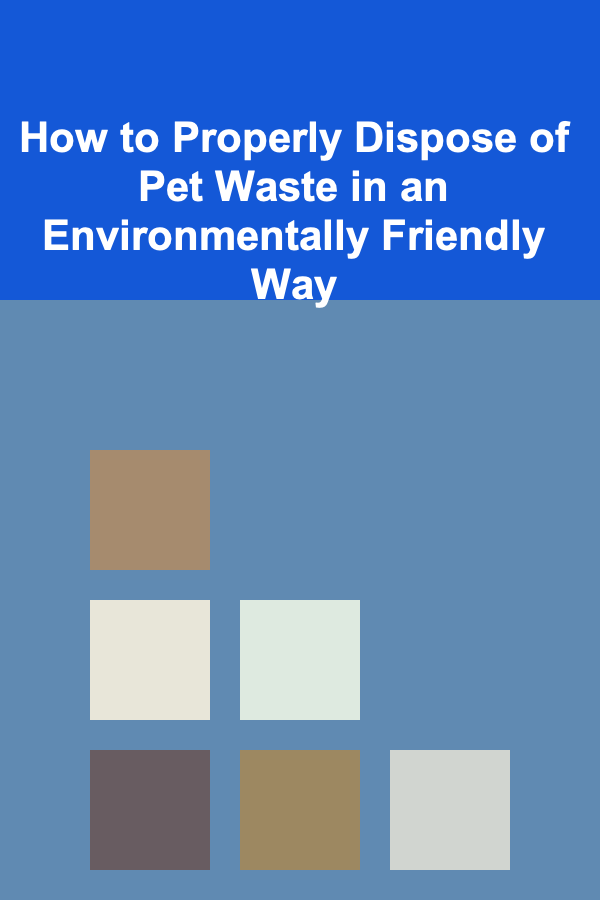
How to Properly Dispose of Pet Waste in an Environmentally Friendly Way
ebook include PDF & Audio bundle (Micro Guide)
$12.99$11.99
Limited Time Offer! Order within the next:

Pet waste is an issue that affects many pet owners across the world, particularly in urban environments. Whether you have a dog, cat, or other pets, waste disposal is an essential yet often overlooked aspect of responsible pet ownership. Improper disposal of pet waste can have detrimental effects on the environment, public health, and the well-being of wildlife. In this article, we will explore the importance of proper pet waste disposal, the environmental impacts of improper disposal, and various environmentally friendly methods to manage pet waste.
The Environmental Impact of Improper Pet Waste Disposal
Before diving into ways to dispose of pet waste in an environmentally friendly manner, it's important to understand why proper disposal matters. Improperly discarded pet waste can have significant negative consequences on the environment.
1. Water Contamination
Pet waste, particularly dog feces, contains harmful bacteria, parasites, and nutrients that can contribute to water pollution. When pet waste is left on the ground, especially near water sources, rainwater can wash the feces into rivers, streams, and lakes, causing contamination. This can lead to waterborne diseases, harming aquatic life and even affecting the quality of drinking water for humans.
2. Soil Contamination
Pet waste contains nitrogen and phosphorus, both of which are nutrients that, when introduced in excessive amounts into the soil, can disrupt local ecosystems. These nutrients can cause algae blooms in water bodies, leading to oxygen depletion and death of aquatic organisms. On land, pet waste can alter soil composition, affecting plant growth and health.
3. Public Health Risks
Pet waste often contains bacteria like E. coli, Salmonella, and parasites like roundworms and hookworms. When pet waste is improperly disposed of, these harmful organisms can spread, posing risks to human health, especially in areas where children or other pets play. These pathogens can cause illnesses ranging from gastrointestinal issues to more severe infections.
4. Aesthetic Issues
In public spaces, parks, and residential areas, the accumulation of pet waste not only causes unpleasant smells but can also reduce the quality of life for the community. Feces on sidewalks, grass, and other common areas detracts from the beauty of the environment and can lead to complaints and frustration from the public.
Best Practices for Environmentally Friendly Pet Waste Disposal
There are several environmentally responsible ways to dispose of pet waste. Below, we will discuss various methods that reduce the impact on the environment while ensuring pet owners fulfill their obligations to their communities and public spaces.
1. Use Biodegradable Poop Bags
One of the simplest ways to dispose of pet waste responsibly is to use biodegradable poop bags. Unlike traditional plastic bags, which take hundreds of years to decompose in landfills, biodegradable bags are designed to break down more quickly and are made from materials that are less harmful to the environment.
Key Considerations for Biodegradable Bags
- Material Composition: Look for bags made from plant-based materials, such as cornstarch, that are designed to break down in a composting environment.
- Proper Disposal: Even biodegradable bags require proper disposal. They should be thrown away in composting or waste management facilities that can handle organic waste. If disposed of in landfills, biodegradable bags will still take a long time to break down due to the lack of oxygen.
- Certification: Check for certifications such as ASTM D6400, which indicates that the bags meet certain compostability standards.
Biodegradable bags are a great step forward in reducing plastic waste, but pet owners should be mindful of how and where they dispose of the bags to maximize their environmental benefits.
2. Composting Pet Waste
Composting is an excellent method of disposing of pet waste in an environmentally friendly way. When done correctly, composting transforms pet waste into valuable organic material that can be used to enrich the soil.
Benefits of Composting Pet Waste
- Reduces Landfill Waste: Instead of throwing pet waste in the trash, composting it reduces the amount of waste going to landfills.
- Improves Soil Quality: The composted material can be used to improve the health of soil in gardens or lawns (note: pet waste compost should not be used on food-producing plants, as it can contain pathogens).
- Decreases Greenhouse Gas Emissions: Landfills produce significant greenhouse gases as waste decomposes anaerobically (without oxygen). Composting pet waste in an oxygen-rich environment prevents this and reduces overall emissions.
How to Compost Pet Waste Safely
- Separate Pet Waste from Food Waste: Do not mix pet waste with compost intended for food scraps. The pathogens in pet waste can contaminate food crops.
- Use a Pet-Specific Composting Bin: A special composting bin designed for pet waste helps to control odors and ensures the waste is broken down properly. These bins often have lids and ventilation to facilitate decomposition.
- Maintain Proper Temperature: Pet waste should be composted at high temperatures to kill harmful bacteria and parasites. This can be achieved by regularly turning the compost and ensuring it remains warm.
- Avoid Composting in Small, Residential Areas: Composting pet waste is not suitable for all environments. In densely populated urban areas or areas without proper composting facilities, it's better to use other disposal methods.
3. Flush Pet Waste
Flushing pet waste down the toilet is an effective and eco-friendly option for many pet owners, as long as it's done properly. Flushing waste ensures that it is processed at a wastewater treatment facility, where it is treated before being released into the environment.
Considerations for Flushing Pet Waste
- Flushable Poop Bags: Some biodegradable bags are designed specifically to be flushable, offering a simple way to dispose of waste without the need for bags.
- Flushing Directly: In some cases, you may be able to flush pet waste directly down the toilet without using a bag, especially for smaller pets. However, this should only be done if the waste is free from contaminants such as toxic chemicals or medications.
- Avoid Flushing Non-Flushable Items: Many pet waste bags, even biodegradable ones, may not break down properly in the sewage system. Always check whether a bag is truly flushable before using it.
Flushing pet waste is a great solution for pet owners who live in areas with a reliable sewage treatment system. It minimizes waste that ends up in landfills and reduces contamination risks to the environment.
4. Use a Pet Waste Disposal System
There are various pet waste disposal systems on the market designed to help pet owners manage waste efficiently and hygienically. These systems usually work by breaking down pet waste in a controlled manner, either using chemicals, aerobic processes, or high temperatures.
Types of Pet Waste Disposal Systems
- In-Ground Systems: These systems are installed in the yard and work by using a buried container where pet waste is deposited. The system may include enzymes or bacteria to aid decomposition.
- Odor-Controlled Waste Bins: These are large, typically airtight containers where waste is collected and stored until it is picked up or processed. Some models use deodorizing agents to control unpleasant smells.
- Pet Waste Incinerators: In some areas, there are pet waste incinerators available that burn pet waste to ashes. This option is environmentally friendly if used with proper filters and systems to control emissions.
These systems are particularly helpful for people with multiple pets or those living in areas where composting or flushing is not practical. However, they require an initial investment and ongoing maintenance.
5. Educate Others and Advocate for Local Solutions
Beyond managing your pet waste, it's important to encourage others to be responsible as well. Educating fellow pet owners, friends, and neighbors about the environmental impacts of pet waste can have a broader, positive impact. Moreover, supporting local initiatives like waste disposal programs or composting services can help create a community that works together to solve the problem.
6. Supporting Legislation and Pet Waste Programs
In many communities, there are pet waste management programs that provide biodegradable bags, composting bins, or waste collection services. Supporting these initiatives, whether through volunteer work, donations, or simply participating, can help strengthen efforts to reduce pet waste in public spaces and landfills.
Conclusion
Proper disposal of pet waste is crucial for protecting the environment, public health, and the quality of life in our communities. By adopting environmentally friendly practices, such as using biodegradable bags, composting, flushing, or utilizing pet waste disposal systems, pet owners can make a significant impact. Moreover, taking a proactive role in educating others and supporting local initiatives can help foster a culture of responsibility around pet waste management.
As pet owners, it's our duty to consider the long-term impacts of our actions on the environment and take steps to minimize waste. With more sustainable solutions available than ever before, disposing of pet waste responsibly is an achievable goal that benefits not just our immediate surroundings but the planet as a whole.
Reading More From Our Other Websites
- [Personal Investment 101] How to Build AI-Powered Apps that Generate Passive Income
- [Gardening 101] Choosing the Perfect Garden Planters for Your Outdoor Space
- [Home Lighting 101] How to Add Layers of Light to Your Dining Room for Special Occasions
- [Home Budget 101] How to Set Up a Home Budget That Helps You Pay Off Debt
- [Home Family Activity 101] How to Create a Family "Puzzle Wall"
- [Skydiving Tip 101] First-Time Freefall: What to Expect When Skydiving with a Certified Instructor
- [Personal Investment 101] How to Make Money from Deep Learning Without Investment
- [Toy Making Tip 101] From Sketch to Plaything: Creative Sparks for DIY Toy Design
- [Weaving Tip 101] Stories Woven Together: Sharing Intergenerational Memories Through Handcrafted Textiles
- [Organization Tip 101] How to Make a Family Calendar for Better Coordination

How to Attract High-Quality Tenants to Your Rental Property
Read More
How to Make Your Home Look Bigger Using Lighting Techniques
Read More
How to Use Cash Flow to Fuel Your Investment Strategy
Read More
How to Understand Blockchain Technology from Scratch
Read More
How to Create a Zero-Waste Shopping List
Read More
How to Grill Fruits for a Sweet Summer Treat
Read MoreOther Products

How to Attract High-Quality Tenants to Your Rental Property
Read More
How to Make Your Home Look Bigger Using Lighting Techniques
Read More
How to Use Cash Flow to Fuel Your Investment Strategy
Read More
How to Understand Blockchain Technology from Scratch
Read More
How to Create a Zero-Waste Shopping List
Read More